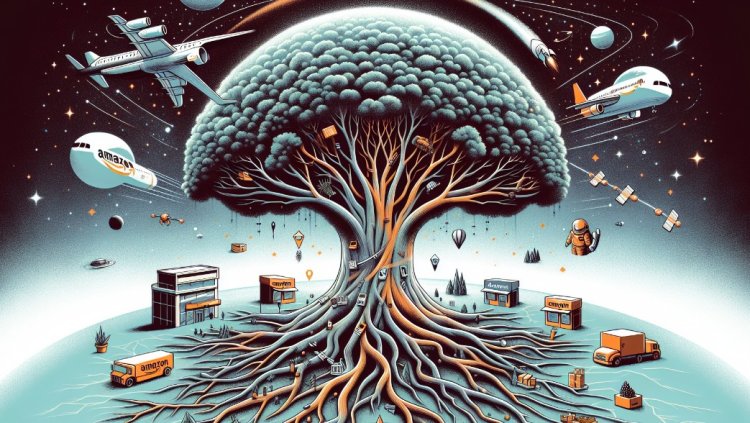The Rise and Controversies of Amazon: From Online Bookstore to E-commerce Empire
"Discover the extraordinary story of Amazon and its founder, Jeff Bezos, in 'Amazon Empire: The Rise and Reign of Jeff Bezos.' This article chronicles the journey of one of the world's most powerful companies and its visionary leader, exploring their profound impact on global commerce and technology."

Introduction
Jeff Bezos created Amazon.com and changed how we shop online. He's the wealthiest guy on the planet and has turned Amazon into a giant that rules over many industries. We're going to look at how Amazon grew and why some people are upset with it. There's a team that made "The Facebook Dilemma," and they checked out what Amazon does and its power.
In this blog post, we'll talk about what Amazon did to get so big and how it's doing things that not everyone likes. Some workers, book people, and small shops have pointed fingers at Amazon for not being nice, being too bossy, and hurting little businesses.
We're going to track Amazon from when it was just selling books online to now being everywhere, helping you understand why Amazon matters so much in today’s shopping world.
The Vision to Colonise Space
Jeff Bezos isn’t just into selling stuff; he also dreams of sending people into space to live there. He thinks outer space is where we need to go to keep growing the economy and handle more people. Since he was in high school, he knew Earth has its limits, and we have to think bigger.
Bezos links his push for people to buy more stuff to wanting a better future for everyone. He imagines us having wider chances and nicer homes, even if it means living off Earth.
So in May 2019, Bezos showed off his space plan. He calls it Blue Moon—it's a ship meant to fly to the moon and let people live there. His goal? To make huge space structures big enough to fit a million people, with fake gravity made by spinning worlds.
When Bezos talks about Earth's limits, it's a big deal. It points out that we need to push past what we know and discover new places. Bezos thinks about a space-colonized future where humans do well and keep advancing. This idea aims to keep us going strong for a long time.
Growing the Amazon Giant
Jeff Bezos started Amazon.com after working on Wall Street. In the early 90s, he got the internet bug from David Shaw's smart use of data. The web was booming, and Bezos chose books as his first online sales item because there were so many. He aimed to make a store that could only exist online, with an endless choice of books.
Even though folks around him were dubious, suggesting he should maybe only sell books at night or on weekends, Bezos was set on showing them they were wrong.
Picking 'Amazon' as the name was no small thing. Bezos wanted a name as big as his dream: to have the biggest online shop that would lead in lots of markets and change how we buy stuff. The name 'Amazon' fits the bill.
In 1995, Bezos opened Amazon.com, starting what we now see as the king of e-commerce. Data was his secret sauce—figuring out what people liked and giving shopping tips just for them. This way of using information meant Amazon kept getting better and made shopping great for their customers.
Amazon didn't stop with books. Bezos kept pushing into other things to sell, turning Amazon into a massive force worldwide.
Amazon transformed into a marketplace where other companies, regardless of size, could offer their products to Amazon's numerous customers. This shift not only spurred Amazon's expansion but also changed how companies function online.
Even though Amazon faced criticism regarding the way it treats workers and its market power, Bezos kept his eyes on the prize. He had faith in making customers the top priority, pursuing new ideas, and exploring new possibilities. By introducing services like Amazon Prime and investing in advanced technology such as robots, Bezos made sure Amazon stayed ahead of the curve, guaranteeing ease and effectiveness for customers.
Nowadays, Amazon is a shining example of Bezos's resolve and skill in creating a giant from a small online bookshop. With a wide array of items, exceptional customer support, and continual innovation efforts, Amazon has become a staple in today's shopping world.
Shaking Up and Changing Industries
Amazon's quick expansion has changed the game, shaking up and changing multiple industries. We'll look at the main ways Amazon has had an effect:
1. Amazon's Rule and Retail Space
Amazon began as a simple online bookstore but soon grew into a retail space for other sellers. Nowadays, Amazon opens its doors to both large and small companies to offer their goods to a huge audience of customers. This strategy boosted Amazon's own growth and also changed how companies work in today’s online world. Selling everything on the internet has become common thanks to Amazon.
2. Control in the Book World
The weight of Amazon’s presence in the book market is undeniable. Through the years, Amazon has pushed book publishers around by using its strong position in the market. Publishers worry about the kind of influence Amazon has on the entire book industry. On top of that, when Amazon rolled out the Kindle, it really shook things up. It changed the way people read books and posed a challenge to old-school publishing methods.
3. Not Paying Sales Tax and Focusing on the Future
For a long time, Amazon didn't have to charge sales taxes like brick-and-mortar stores did. This let them slash prices and get ahead of competitors. In addition, Amazon plays the long game; they've always focused more on growing big in the future than making quick cash. Amazon hasn't shied away from pouring money into things like updated tech, new infrastructure, and making customers happy, even if it means losing money now. Thanks to this approach, Amazon has taken over online shopping and keeps bringing new things to the table.
Amazon's speedy rise and its game-changing ways have made big waves in industries and turned the retail scene on its head. From creating a marketplace for other businesses to pushing around book publishers, there’s no denying Amazon's effects. Its approach to not charging sales tax and its vision for ongoing growth are key parts of why it stands so tall today.
Power and Controversies
Amazon, under Jeff Bezos' leadership, dominates the online retail industry, but not without issues. The company's cutthroat methods, growing control, and possible monopoly worries have caught the public's eye.
Investigation into Working Conditions
Critics are looking at how Amazon treats warehouse staff. They're unhappy about the tough work speeds and strict targets. Workers say they feel like machines, not people.
Amazon's Stance Against Unions
Amazon doesn't like unions, and that's causing a stir. Some employees want to form unions for better job conditions and pay, but they say Amazon's clout makes it hard to speak up.
Delivery System and Worker Safety
The way Amazon delivers parcels is raising safety concerns. Drivers have been in accidents, even fatal ones. The push for fast deliveries and the use of outside drivers may be increasing dangers.
As Amazon keeps reshaping retail, the arguments about its influence raise big issues about how it treats its workers in pursuit of success. To deal with these issues and make sure the company answers for its actions.
Conclusion
Amazon has come a long way, from selling books online to becoming a major force in retail worldwide. It's grown incredibly, but it's also run into a lot of trouble. Starting as a small operation, Amazon has turned the e-commerce world upside down and shaken up many business sectors. But this climb to the top has been bumpy, attracting criticism along the way.
The effect Amazon has on society and the business world is undeniable. It's changed how we buy things, challenged old-school ways of doing business, and altered the entire shopping sector. Still, there are ongoing arguments about Amazon's reach, how it treats workers, and its control of the market.
There have been investigations into how Amazon treats its employees in their warehouses and concerns about safety. There's also talk about how they feel about employee unions. Some people say Amazon is too focused on being fast and efficient, which might hurt their workers' health and happiness.
Despite the issues, Amazon continues to be a key player in the e-commerce game. Its clever moves, like Amazon Prime and investing in new tech, have helped it grow and keep customers happy. The company always puts customers first and strives to get better all the time, earning the trust and loyalty of millions around the globe.
Thinking about Amazon's journey and dilemmas, it's key for us to think about what role the company plays in society and the economy. These debates over Amazon's power, worker conditions, and its role in different industries pose big questions about finding the right mix of business success and taking care of social duties.



 admin
admin 










